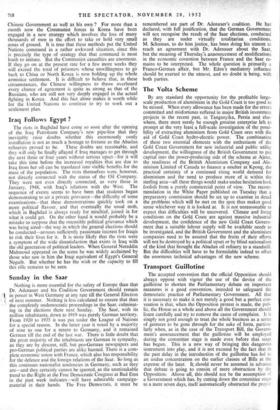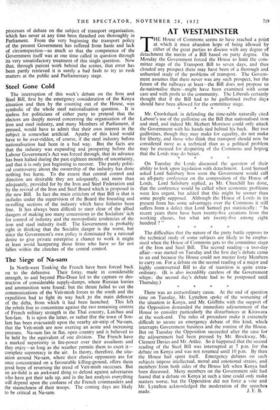Transport Guillotine
The accepted convention that the official Opposition should always oppose with vigour the use of the device of the guillotine to shorten the Parliamentary debate on important measures is a good convention, intended to safeguard the democratic practice of Parliamentary Government. All that it is necessary to make it not merely a good but a perfect con- vention is that, when the Opposition protest is made, the pub- lic, the House as a whole and above all the Government should listen carefully and try to remove the cause of complaint. It is simply not good enough to treat the whole business as a series of gestures to be gone through for the sake of form, particu- larly when, as in the case of the Transport Bill, the Govern- ment's announcement that the guillotine will be employed during the committee stage is made even before that stage has begun. This is a new way of bringing this dangerous instrument into play, and it is not excused by the fact that in the past delay in the introduction of the guillotine has led to an undue concentration on the earlier clauses of Bills at the expense of the later. It. should never be assumed in advance that debate is going to consist of mere obstruction by the Opposition. Above all, this should not be the assumption of a Government which has, by cutting down the committee stage to a mere seven days, itself automatically obstructed the proper processes of debate on the subject of transport organisation, which has never at any time been thrashed out thoroughly in Parliament From the very beginning the transport policy of the present Government has suffered from haste and lack of circumspection—so much so that the competence of the Government itself was at one time called in question through its very unsatisfactory treatment of this single question. Now that, through patient work behind the scenes, that error has been partly retrieved it is surely a bad fault to try to rush matters at the public and Parliamentary stage.



































 Previous page
Previous page